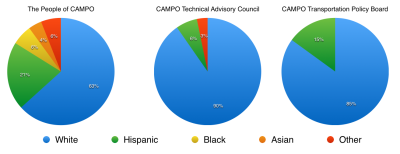Houston Regional Planning Agency Installs All White Male Executive Committee

The Houston – Galveston Area Council Transportation Policy Council (TPC) has voted to fill its powerful executive committee this year with only white men [PDF]. The five men on the panel will represent a region that is the most diverse in the nation and home to about 3.4 million women.
The TPC generally oversees about $2.5 billion in transportation spending across the eight-county region, allocating it between modes and among different communities. The executive committee makes decisions that affect street safety, the quality of transit, access to schools and jobs, and the cost of living in the Houston region.
The 2017 TPC officers (pictured left to right above) are:
- Chairman — Judge Matt Sebesta, Brazoria County
- 1st Vice Chair — Commissioner Rusty Senac, Chambers County
- 2nd Vice Chair — Commissioner Ken Clark, Galveston County
- Secretary — Honorable Tom Reid, City of Pearland
- Past Chair — Honorable Ed Emmett, Harris County
You can watch deliberations in this video (skip to item five). There was no discussion of the membership of the executive committee before the vote. It appears that no people of color participated in the discussion, although one woman asks a clarifying question off camera.
Four of the five members of the executive committee represent counties. The only city representative is Reid, the mayor of Pearland.
The city of Houston, home to about 2.2 million people, is not represented. Underrepresentation of urban areas in metropolitan planning organizations (MPOs) results in less investment in transit, according to research published in the Journal of the Transportation Research Board.
Texas MPOs seem to believe that executive committee meetings are not considered subject to the Open Meetings Act. There is no notice of TPC executive committee meetings or channel for the public to attend, listen, comment, read agendas or minutes, or watch video of deliberations. According to the Texas Attorney General, if any decisions are made in such a committee and “rubber stamped” by the TPC, then the committee becomes subject to the Open Meetings Act. But it does not appear that someone has challenged a Texas MPO on the secretive practice of executive committees in court.
While troubling, this decision to exclude people of color and women from a powerful and secretive committee is not uncommon in Texas. You can further explore the inequitable makeup of decision making boards at Texas MPOs in my recently completed research project, the Texas Transportation Equity Assessment.
